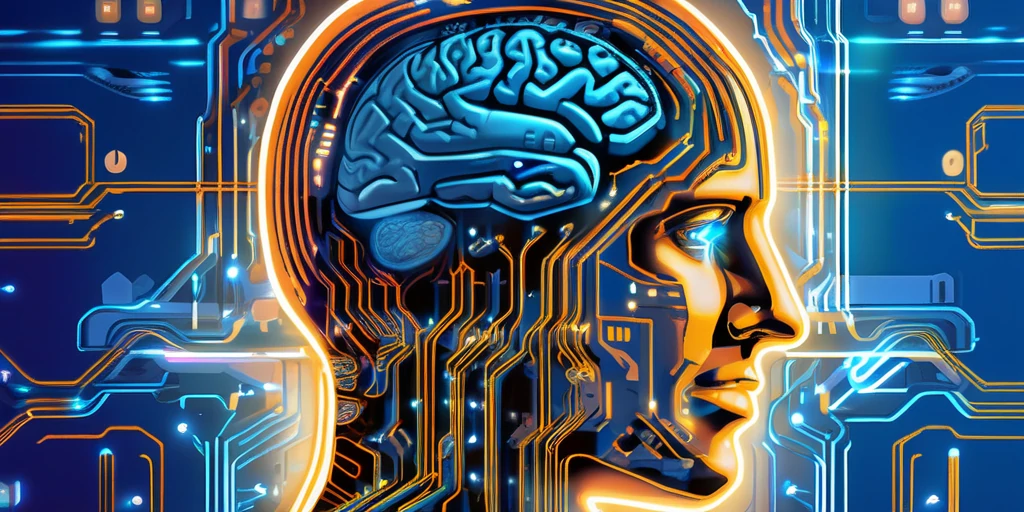
AI in the Enterprise
The integration of Artificial Intelligence (AI) in the enterprise has become a game-changer, revolutionizing the way businesses operate and adapt to an ever-evolving market. In this essay, we will delve into the impactful role of AI in the enterprise and explore its wide range of applications. AI, with its ability to process vast amounts of data efficiently, analyze patterns, and make intelligent decisions, holds immense potential for transforming various aspects of business operations.

The focus of this essay is to shed light on the benefits, use cases, challenges, and future trends surrounding AI in the enterprise. We will examine the ways in which AI enhances efficiency, decision-making, customer experience, and resource optimization within organizations. Additionally, we will discuss specific examples of AI integration, including the powerful suite of tools offered by GPT Enterprise, which assists businesses in content creation, document management, second brain technology, and image creation.
By providing a comprehensive understanding of AI in the enterprise, this article aims to inform and educate both technical professionals and laymen about the potential of AI as a catalyst for innovation and growth in businesses of all sizes. So, let us delve into the realm of AI and explore its transformative impact on the world of enterprise.
Benefits of AI in the Enterprise
Artificial Intelligence (AI) brings a plethora of benefits to businesses, transforming their operations and driving success. Let's explore some of the key advantages of integrating AI into the enterprise landscape.
Increased Efficiency and Productivity:
AI technologies enable businesses to automate mundane and repetitive tasks, freeing up valuable time and resources for employees to focus on more strategic and creative endeavors. By leveraging AI-powered solutions, companies can streamline processes, reduce manual errors, and optimize workflows. Tasks such as data entry, document processing, and inventory management can be automated, leading to significant time and cost savings.
Improved Decision-Making and Problem-Solving
AI empowers businesses with data-driven insights and advanced analytics capabilities. By analyzing vast amounts of structured and unstructured data, AI algorithms can detect patterns, uncover trends, and provide valuable insights for informed decision-making. AI-powered predictive models enable businesses to anticipate market trends, forecast demands, and optimize inventory levels, leading to better strategic planning and resource allocation.
Enhanced Customer Experience and Personalization
In the digital age, providing a personalized and seamless customer experience is crucial for businesses. AI technologies enable companies to analyze customer behavior, preferences, and feedback to deliver highly personalized recommendations, product offerings, and services. AI-powered chatbots and virtual assistants provide round-the-clock customer support, addressing queries efficiently and improving response times. This personalized approach enhances customer satisfaction, fosters loyalty, and drives customer retention.
Cost Savings and Resource Optimization

Implementing AI solutions can result in significant cost savings for businesses. AI automates labor-intensive processes, eliminating the need for manual intervention and reducing human error. This not only improves operational efficiency but also leads to cost savings through reduced labor costs and increased productivity. AI algorithms can optimize resource utilization, such as energy consumption and inventory levels, minimizing waste and maximizing efficiency.
GPT Enterprise and AI in the Enterprise
GPT Enterprise, an AI-based suite of tools, has emerged as a valuable asset for businesses seeking to harness the power of AI in their operations. With its advanced capabilities and user-friendly interface, GPT Enterprise offers a range of features that assist businesses in content creation, management, and beyond. Let's explore how GPT Enterprise can empower organizations to leverage AI effectively.
How GPT Enterprise aids in content creation and management
Content creation is a critical aspect of modern business operations. GPT Enterprise simplifies this process by providing a host of creation tools and countless templates and frameworks.
 These tools enable users to create a wide range of content, including social media posts, articles, blog posts, PowerPoint presentations, advertising materials, emails, and websites. With GPT Enterprise's templates, users can generate high-quality content in a matter of seconds, saving substantial time and ensuring consistency in messaging.
These tools enable users to create a wide range of content, including social media posts, articles, blog posts, PowerPoint presentations, advertising materials, emails, and websites. With GPT Enterprise's templates, users can generate high-quality content in a matter of seconds, saving substantial time and ensuring consistency in messaging.
The document utility feature of GPT Enterprise further enhances the content management process. Businesses can easily manage, sort, and locate any document created with GPT Enterprise. Additionally, documents can be downloaded in various formats such as Word documents, PDFs, or text files for seamless sharing and collaboration.
AI in the Enterprise Specific Use Cases of GPT Enterprise in Various Business Functions:
GPT Enterprise's AI-driven tools offer immense value across different business functions, providing innovative solutions to enhance efficiency and productivity. Let's delve into some specific use cases where GPT Enterprise can make a significant impact.
1. Marketing and Advertising
GPT Enterprise empowers businesses with its content creation tools to develop compelling marketing collateral. For instance, social media posts can be easily generated using GPT Enterprise's templates, enabling businesses to reach their target audience effectively. Additionally, GPT Enterprise's image creation tools aid in creating visually appealing graphics that capture attention and convey messaging with precision.
2. Research and Development
The AI chatbot within GPT Enterprise proves invaluable in the research and development process. Researchers can leverage this tool to brainstorm ideas, gather relevant information, and create outlines for their projects. The AI chatbot's ability to mine data and highlight key insights expedites the research process, enabling professionals to make informed decisions and drive innovation.
3. Customer Relationship Management (CRM):

GPT Enterprise's AI chatbot plays a crucial role in enhancing customer support and CRM activities. The chatbot enables businesses to handle customer inquiries promptly by providing accurate and personalized responses. This not only reduces response times but also improves overall customer satisfaction. Additionally, the AI chatbot's integration with the document utility feature allows for the seamless update and retrieval of customer-related information, making customer interactions smoother and more efficient.
4. Human Resources
GPT Enterprise offers valuable assistance in human resources functions. The AI chatbot can provide HR personnel with templates and guidance for creating job descriptions, employee handbooks, and onboarding materials. Moreover, the document utility feature allows HR teams to efficiently manage, sort, and retrieve important documents, such as resumes, performance evaluations, and training materials.
5. Data Analysis and Reporting
GPT Enterprise's AI capabilities assist businesses in analyzing and interpreting large volumes of data. By automating data analysis tasks, such as identifying patterns, trends, and correlations, businesses can gain valuable insights for strategic decision-making. GPT Enterprise's document utility feature also enables users to generate detailed reports with ease, improving information dissemination across the organization.
Challenges and Considerations
While the integration of Artificial Intelligence (AI) offers numerous advantages to businesses, it also presents challenges and considerations that need to be addressed for successful implementation. Let's explore some of these key challenges and considerations surrounding AI in enterprise settings.
Ethical Implications of AI in Enterprise Settings:
As AI becomes more prevalent in business operations, ethical concerns become increasingly important. Issues such as bias in AI algorithms, transparency in decision-making processes, and accountability for AI-driven outcomes need to be carefully considered. Businesses must ensure that their AI systems are designed and implemented in a manner that upholds ethical standards and avoids discriminatory practices.

Data Privacy and Security Concerns
AI relies heavily on vast amounts of data for training and decision-making, and this raises concerns about data privacy and security. It is crucial for businesses to implement robust measures to protect customer and proprietary data from unauthorized access or breaches. Complying with relevant data protection regulations and establishing strict data governance frameworks are essential for maintaining trust and safeguarding sensitive information.
Workforce Impact and Re-skilling Needs
AI integration in the enterprise landscape may lead to changes in job roles and workforce dynamics. Automation of certain tasks, driven by AI, can potentially result in job displacement or shifts in skill requirements. To address this challenge, businesses must proactively prepare their workforce for the future by fostering a culture of continuous learning and providing re-skilling opportunities to ensure employees remain valuable contributors in an AI-driven environment.
Balancing AI with Human Judgment and Expertise
While AI can automate and augment various processes, it is crucial to recognize that human judgment and expertise still play a vital role. It is essential to strike a balance between AI-driven automation and human decision-making. Businesses must identify areas where AI can provide valuable insights and support, while ensuring that human professionals have the ability to exercise critical thinking, contextual understanding, and ethical judgment when necessary.
Addressing these challenges and considerations requires a comprehensive approach that involves collaboration between business leaders, technology experts, policymakers, and stakeholders. Establishing clear guidelines, ethical frameworks, and robust data protection measures is crucial in building a responsible and sustainable AI ecosystem within the enterprise.
By proactively addressing these challenges and considerations, businesses can navigate the potential pitfalls of AI implementation while reaping the benefits and maximizing the potential of AI to drive innovation, efficiency, and growth within the enterprise.
Transform Your Business Today with GPT Enterprise
Get 10,000 credits free, no credit card is required. Take the leap and experience unparalleled efficiency and success with our AI-powered business suite.



